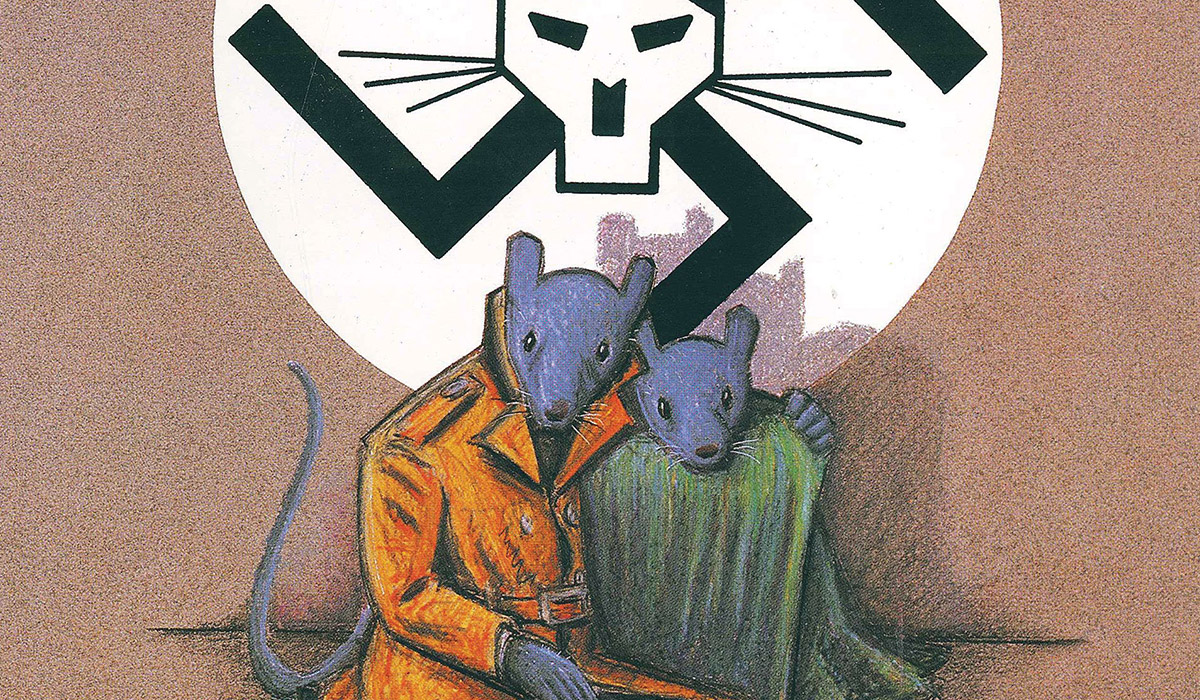On Eve of Holocaust Remembrance Day, Schools Shamefully Ban Graphic Novel Maus

District, city, county, and state book bans have not slowed just because they’re not appearing on your timelines as frequently, and the latest victim is Art Spiegelman’s Pulitzer Prize-winning graphic novel, Maus. On January 10, in a vote of 10-0, all McMinn County School Board members in Tennessee voted to remove Maus from the eighth-grade curriculum.
The two-part graphic novel details the strained relationship of Spiegelman and his father and the generational trauma inflicted by his family’s survival of the Holocaust. Spiegelman uses anthropomorphized mice, pigs, and cats to tell the story.
While they did list why the book was brought before the board and banned, none of the reasons are good enough. These include nudity (specifically female nudity), language, and violence. With a subject like the Holocaust, what did they expect?
In addition to only taking cursory glances at pages, people took issue with the school board appearing to be siding with the Nazis—not just because of the political makeup of the county (in which 80% voted for the White Nationalist candidate), but also because Nazis were infamous for book burning.
Don’t get it twisted; America continues to engage in fascism, too. In the late ’40s and early ’50s, comic book burning was all the rage. As recently as November, we shared how a Virginia school district looked to burn books they saw as obscene.
The Maus ban happened two weeks ago but gained traction last night because today is International Holocaust Remembrance Day.
Art Spiegelman has replied to a few reporters about this ban by calling it “absurd.” He’s also shared images of the bookmark he made in association with Banned Book Week that reads, “Keep your nose in a book— and keep other people’s noses out of which books you choose to stick your nose into!”
When Maus was banned before
The over 30-year-old graphic novel has a history of challenges but usually makes the news when it occurs outside of the U.S.—especially in socialist or communist-lite nations. Countries like both Germany and Russia ban swastikas to certain extents, which causes problems.
Within Russia, the books were taken down in 2015 in fear of backlash because it was coming up on the 70th anniversary of Victory Day (May 9). The New York Times reported city officials in Moscow planned to do raids looking for objects that “offend people’s religious feeling or question the national dignity of peoples”—both criminal offenses.
Like the U.S., the fear of retaliation came from people worried about those who would take the image out of context, a.k.a. something easier to do with graphic novels and comic books. We saw this with recent statewide bans of graphic novels like Gender Queer: A Memoir by Maia Kobabe.
Germany bans all swastikas except when used in a historical context. While the graphic novel uses real history, the story also uses animals as people. Additionally, there’s a level of removal because Maus depicts Spiegelman’s father sharing the story with his son.
Spiegelman told The Guardian that he made the swastika’s inclusion on the cover a stipulation on all publishing contracts. When it came time to translate the novel to German, they had to get special permission from the German culture ministry, who applied this magical thing called context and nuance.
Act II: Community Libraries
In a time of backlash about the so-called Critical Race Theory (now a catchall for everything Republicans don’t like, like the word socialism), Maus can easily be banned. Many describe the novel accurately as anti-fascist (yes, like Antifa or the U.S. military image during WW2) and anti-Nazi.
States’ recent laws to address the right’s latest manufactured culture war are so sweeping that they instruct educators to teach the Holocaust, Nazism, and fascism in a neutral light. This frequently winds up being walked back, but this is happening everywhere, including Florida, Texas, and Indiana.
Teachers and librarians have warned about how censorship will start with one book. After moving the line of acceptable bans, the horrors of chattel slavery and (government recognized) genocide will soon follow as unacceptable topics.
These movements are well-funded, well-organized, and angry people who have nothing better to do than cosplay the Jim Crow era are emboldened by the consistent (state-level) legislative wins. The Guardian recently shed some light on how Moms For Liberty, Parents Defending Education, and No Left Turn have directed parents to censor books for everyone, not just their kids.
The situation with Maus happened in the confines of a classroom, which is terrible enough to warrant discussion, but librarians are sounding the alarms that the fight against book censorship is into public libraries. Librarians on Twitter, TikTok, and Reddit share resources to prepare themselves for the battle, but it takes community support from patrons to help them. (Which we outlined here.)
(via Tennessee Holler, images: Pantheon Books.)
Want more stories like this? Become a subscriber and support the site!
—The Mary Sue has a strict comment policy that forbids, but is not limited to, personal insults toward anyone, hate speech, and trolling.—
Have a tip we should know? tips@themarysue.com